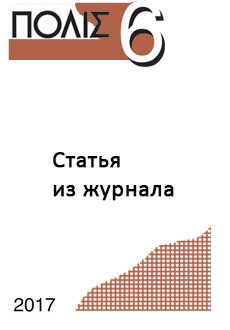Online shop of "Polis. Political Studies" Journal
We in the world, the world in us
Rozov N.S. Crisis and Revolutions: Fields of Interaction, Actors’ Strategies, and Trajectories of Conflict Dynamics. – Polis. Political Studies. 2017. No 6. P. 92-108
150 руб.
socio-political crisis; social revolution; violence; social conflict; suppressive strategies; political negotiations; revolutionary dynamics; overthrow of power; post-revolutionary regimes; civil war; state breakdown; democratization.
Definitions of socio-political crisis and the social revolution are given on the basis of a critical analysis of the most popular concepts by Th. Skocpol and J. Goldstone. The main stages of crisis aggravation are singled out: pacification or suppression of revolution, significant concessions to protest, overthrow of power, state breakdown and destruction of key social institutions. The typology of fields of political interaction is presented: from peaceful institutional one (legal, administrative) to the most brutal fields (open street violence, armed violence, and civil war). The transition to an open conflict is treated as a parties’ choice of suppressive strategies, because previous fields of interaction and peaceful strategies have received negative reinforcement. The emerging circumstances and the course of interaction determine the main channels of conflict dynamics: the escalation of violence usually leading to victory of one party over others, resumption of peaceful strategies and unstable situation, smoldering and recurring conflict that can last for years. Typical consequences of power overthrow vary from democratization and successful development, to civil war and state breakdown, to establishment of a new authoritarianism. Differentiating conditions for these options are considered.
 English
English Русский
Русский

Reviews
There are no reviews yet.